Robert Macfarlane, high chieftan of logophiles everywhere, has dedicated entire books, including 2015’s Landmarks and 2017’s The Lost Words, which he co-authored with Jackie Morris, to preserving words and their original meanings. That’s why the Old English word wyrd might be the best term to describe the origins of his beautiful friendship and subsequent collaboration with actor and musician Johnny Flynn. The progenitor of our modern-day “weird” originally meant something closer to fate or destiny, with a little twist of the supernatural—a perfect description of the forces that bond them.
Long before they met, Johnny Flynn & the Sussex Wit, the folk-rock band Flynn founded more than a decade ago, provided Macfarlane with “tracks to make tracks to.” Flynn appears in the acknowledgements of 2012’s The Old Ways in which Macfarlane guesses he had “walked perhaps 7,000 or 8,000 miles on footpaths so far” in his life, and Flynn’s music has continued to provide the author with a walking soundtrack, even though he jokes that it once almost led to his demise when, too busy concentrating on Flynn’s music, he almost fell into a Alpine crevasse.
Flynn, who will be appearing as Dickie Greenleaf in the upcoming Showtime series Ripley based on Patricia Highsmith’s thriller, has always centered storytelling in his craft. Before he found success onstage, Flynn originally planned on a career as an English teacher, which is apparent in his band’s lyrics, peppered as they are with references to Yeats, Shakespeare, folktales, and ancient myths. So, when Macfarlane, in the early days of the pandemic, suggested a collaboration based on The Epic of Gilgamesh, Flynn was in. The resulting album, Lost in the Cedar Wood, recalls humanity’s oldest story, written in the 3rd Millennium BC, and our most timeless themes—our species’ dual capacity for love and friendship, as well as greed and destruction. Here, the pair discuss the origins of their friendship, the forces that conspired to bring them together, and the books that have defined them along the way.
*
Meg Thomann: Together, you created an album based on humanity’s oldest recorded story, The Epic of Gilgamesh, which is an origin story in a way. What is the origin story of your friendship?
Robert Macfarlane: I was listening to Johnny’s music when I was writing The Old Ways—he’s there, in the acknowledgments. I nearly fell into a crevasse in the Swiss Alps because “The Ghost of O’Donahue” was going through my mind, as it had done for years as a real walking song, a track to make tracks to, when I should have been thinking of my footsteps, and then boof! I went through a snow bridge and fortunately got out with a few cuts and bruises. So, walking and writing and Johnny’s music had been a creative part of my life long before I met him.
Johnny Flynn: And at that time, I was reading Rob’s books and writing songs inspired by the landscapes that he was exploring and the lens that he was seeing things through. We had this amazing synchronicity in our interests, so it felt kind of destined that we would meet.
MT: Who asked the other one out first?
RM: I think I sent Johnny a pack of books because I heard he’d been reading my work through a student of mine who’s a friend of Johnny’s.
JF: That was the first point of contact. And then, did I write to you?
RM: You wrote me an email saying, “I’ve been reading your books, and I’m really happy that I’m in them, and they’re in my music, and why don’t we play cricket?” Not a one-on-one game of cricket—11 people on each side.
JF: It was like when you bring your friend along to make sure that the other person…
MT: Fits in and isn’t a weirdo?
RM: Yeah, that’s hilarious.
JF: So, the first time we actually physically met was literally on the cricket pitch.
MT: Is this the first time you’ve been together since the pandemic started?
RM: No, but we’ve basically been in lockdown in the UK with very few breaks, so much of the making of [the album] went on by correspondence. But we’ve gotten together a fair few times, when laws allowed.
JF: I can still see in the songs a kind of back-and-forth. It was a really beautiful thing to have a collaboration going on during this year of isolation.
MT: Before we get to the main text [The Epic of Gilgamesh] that inspired the album, I want to go back to the beginning. What were the formative books of your childhoods that inspired your interests?
JF: What’s lovely is realizing, as I learn about the things that have shaped Rob, is that there are so many things that also caught my imagination; the same perspective, the wonder at the eeriness of things. And, certain fantasy literature, like Susan Cooper’s books.
RM: Well, I think Susan Cooper is pretty huge in America, too, but if you were growing up in ’70s, ’80s Britain…. I read them in ’89, quite late actually, but also Alan Garner and Robert Holdstock. There’s a supernatural fantasy tradition which is profoundly linked to landscape, and it’s sort of pre-nationalist. These are all people who are interested in resonances of landscape that are local, or that are not obeisant to the nation state. There isn’t a sort of “deep England” that’s being invoked here—it’s a more complex, archeological, deeper time past. And then, some of the old epics in the English tradition—Beowulf, Sir Gawain and the Green Knight—were huge for me as a young reader. And poetry like Gerard Manley Hopkins, Seamus Heaney, and Edward Thomas, the poet we both love very much.
JF: Edward Thomas was a lovely thing to realize was a common [interest]. I went to secondary school in a village called Steep, which was where [Thomas had] lived. It’s surrounded by seven hills, and on one of them is a memorial to Thomas. Through my teenage years, as I was getting into punk and literature and drinking, I discovered Thomas at just the right time. Also, his memorial was in the best drinking spot to hide in, so drinking probably came first, and then I’d be there, looking at this plaque to this poet thinking, Who was this guy? And then, I’d go away and discover his poetry, and be transported. He’s known as a war poet, because he died in the First World War, but it’s really nice to discover this wealth of stuff written at a time when he was a prolific nature writer.
MT: You both have three kids. What are you reading to them?
JF: I’m reading Rob’s books—The Lost Words and Spell Songs from the collaboration with Jackie Morris. My son is really into The Spell Songs and comes to me every day with a new favorite. I’ve introduced him to Susan Cooper and all the amazing fantasy books. We just did The Hobbit.
MT: How did this project come about, and why The Epic of Gilgamesh? Why not The Kalevala? Or some of the other texts that are mentioned in Underland? I actually found it surprising. I’ll tell you why later.
RM: The last year has been a year of hell. And, as the first lines of Gilgamesh has it, “He who looked into the abyss…” [We] stood on that edge, in a way we never have before. But this album wouldn’t exist without the pandemic. I rang Johnny, during the first weeks when the sun was hot, the birdsong was loud, and the fear was strong, and I said, “Look, why don’t we just try and make some work, because it’ll keep me alive and keep me getting up in the morning.” At one point, I said to Johnny, “Who knows what it’ll become?” And with great temerity, I floated the idea that it might grow into an album or an EP. Johnny got in touch a few weeks later and said, “It’s all too much, we can’t think big. Let’s just make one song at a time.” And so we did, and it just took on its own force and rhythm, and ease and joy as well. It became an absolute lifeline for me. And why Epic of Gilgamesh? It’s as simple as the fact that I’d written about it in Underland—it was one of the great subtexts of the subterrain, as it were.
JF: When Rob mentioned it, I knew really nothing about it, but I had always loved going to the British Museum, and especially loved the Mesopotamian section. I’ve always thought that ancient stories unlock something about what is happening now and can be a map to interpreting strange situations. [At the beginning of the pandemic] we were going into this really strange situation, and I wanted a new map.
I was lucky enough to be in a play a few years ago called Jerusalem by Jez Butterworth. He told me that his original inspiration was an ancient myth called King of The Wood. And the story of the play is, there was a king. He was the king of the wood, and then somebody else came along and killed him. And then that person was the king of the wood.
MT: History in a nutshell, right?
RM: Game of Thrones.
JF: Jez had said that all good stories are about somebody facing a death, and the story is in how they transcend the death or rebirth themselves through their own death. When Rob described Gilgamesh, I was like, Well, it’s that, basically, boiled down, so it must be a really good story. And there we were, on the edge of the abyss, this time last year, looking at China and what they were going through, and then looking at Italy, and thinking, Holy shit, it’s coming here! This is a story about realizing your mortality, and these friends are facing death, and learning through death. And because it’s the first recorded story, it felt like the right one to be going back to. And it’s about ecocide as well, which is something that we’re both interested in as a symptom of this age of humanity, and also realizing that it’s always been there. But this is the first “telling of all of the fellings,” as is in our song.
MT: It’s also a story about deep friendship, so I wondered if you saw a little bit of yourselves and your own relationship in that, and if so, who’s the Enkidu and who’s the Gilgamesh?
RM: You don’t really want to be either of them in the end, do you? You’ve got the irresponsible swinging-dick tyrant, and then you’ve got the wild guy from the woods who ends up dying, with a maggot crawling out of his nose. It’s not a good diptych, really.
JF: Neither of them is a great look.
RM: But it is about friendship and love and loss. And, they’re idiots. There is a sort of naive, catastrophic masculinity on display—for Gilgamesh, much of the way through, even up to the point where he is trying to outrun sadness. He’s trying to get away from the loss of Enkidu, which is what gives the lyrics to this the song “Ten Degrees of Strange.” The friendship of the making of this album got me through this year. Everyone has their lockdown story, and the album is a sort of document of friendship and collaboration; of community and creativity. So, in that sense, it shares some values with Gilgamesh, but without the need to destroy everything that you meet.
MT: It’s also a story about the quest for immortality, so is that something that drives you creatively? Making an album, writing a book, creating a film—do you ever think that these works will live on as your legacy after you are gone?
JF: No, not consciously.
RM: There’d be a sort of hubris to that, wouldn’t there? “When I am gone, look at my works, ye mighty, and rejoice!”
MT: But isn’t that maybe why people create in the first place? Like the Red Dancers on the cave wall in Lofoten in Norway that you wrote about in Underland?
RM: What’s interesting about that early artwork is that it’s unsigned— there’s no inscription of the ego into it, so there is a sense that this is a community making. I would love my work to be read and listened to and seen by people I’ll never meet, generations I’ll never know, not as a record of me, but as of a moment, or of a group, or a friendship, or a community.
JF: I think the best part of making art is this unconscious documenting of where we are in this moment. And suddenly, something of the communal takes over when you’re documenting an emotion that you feel subjectively, but you hope has some universality to it—an insight. I think art is saying, “I’m feeling this. If you’re feeling the same way about any of this, I hope it helps.” And this time that we’ve all gone through, where people have been so isolated, that aspect has felt so important—to buoy each other up, to cast lifelines out. And that’s what making art is. It’s kind of a blind lifeboat launch where you just hope that something about what you’re doing speaks to other people, and also to aspects of yourself that you don’t even know about yet. For me, it’s all of those things. And I can’t really conceive of myself, beyond my own lifetime.
RM: There’s a lovely moment in [The Epic of Gilgamesh] that Johnny pointed out to me, which is exactly his idea of lifeboats and moving together. Just before Gilgamesh and Enkidu go into the sacred cedar wood, Enkidu’s really scared. He doesn’t want to go in because he’s heard about the reputation of Humbaba [the guardian of the Cedar Wood]. And Gilgamesh turns to him and says that we’re two rafts of reed, and we will lash ourselves together with rope because two go on better than one. I think we’ve all had to join the rafts together and make friendships across space and time, and through music and culture, or else we’d all have sunk. That’s a lovely example of how these tiny moments from Gilgamesh echo across 4,000 years, clear as bells. So maybe it’s about how stories live on, because they supersede the individual maker. There’s that line that recurs throughout Underland which is, “Are we being good ancestors?”
MT: That’s a quote you borrowed from Jonas Salk, as you mention in the book, and creative borrowing—finding inspiration to create something new from something old—is apparent throughout both of your bodies of work. Who’s inspiring you now?
JF: Since she tragically died, I’ve gone on a journey with [the musician] Sophie. I was so excited by her work, and it’s such a tragedy. I was working on a soundtrack for a film, and that was much more electronic and synth-y, partly because it couldn’t be a band thing because of the way things were. So I’ve been listening to loads of interesting electronic music—a lot of stuff made by friends, and Parmigiani, and old movie soundtracks. I was trying to imagine myself in a cinema watching films scored by Ennio Morricone. I would turn on Radio 3, and there’d be an aria from Madame Butterfly and I’d be in tears before the kids had even woken up. Anything emotional just kind of ruined me this year, and anything with stories of separation.
RM: I’ve been keeping more poetry by the bed than before—Jericho Brown’s, Jorie Graham’s. I’m still working through Vasily Grossman’s Life and Fate. And I find myself, regressively perhaps, going back to music of the late 2000s, which is partly because my daughter’s discovering Stealing Sheep and Beirut. And then, really drinking deep of chlorophyll. Those three things: nature, song, and poetry.
There is a song on the album, “World to Come,” which came from that feeling early on, that although this was an utter catastrophe, it was also, at some level, an opportunity to make a new world, or at least make things better from the shattered rubble that we’ve been left with. Johnny would walk with his children [to explore] the local, nearby nature—and how vital that willow tree with the plastic bags caught in its branches became! We all felt that. That song rises almost to a party at the end, and then there’s a huge smash as someone drops a cutlery basket, and there’s hope and joy in that as well, and that arises from the blackbirds singing.
MT: Are you feeling hope and joy are rising now as things are starting to get back to normal? What are you looking forward to doing?
RM: We want gigs, don’t we Johnny?
JF: I want to be in this sweaty club, with everyone having—
RM: I want you on stage playing these songs.
JF: Obviously, the sweaty club is wishful thinking in the immediate future. You asked, ‘Is hope rising?’ Two days ago it was suddenly spring. It reminded me of right as we went into lockdown. Just as it started, it got really hot, and there was a kind of giddiness about it. There was less noise pollution because of less air traffic and traffic on the streets, and the birdsong was rising at the same time—nature was front and center.
RM: And nature was the virus as well. I want to see mountains! I live basically at sea level, and I just want to see hills and my parents—the two of them are the same thing. I’m talking personally here. I have a whole list of things that I want for culture and society, but just personally, I want live music and I want the hills.
JF: My mum lives in Wales, and like Rob, I’ve been desperate to be able to go to where she is because she’s synonymous with the sea, and a big part of our lives is being able to escape there and be by the sea. And [I miss] communal storytelling. Because my background is in the theater, a lot of my friends, including my wife, are freelance theater makers. The national theater here did put some past productions online, and that was lovely to be able see, but for me, it was only a reminder of just how important it is to be in one room together. The most special nights in the theater, or onstage singing with my band, have been when I’ve felt that moment when everybody’s heart starts to beat in time, and that commonality that is so hard to experience in any other way.
RM: For all the miracles of Zoom, it’s never going to do that. The three great rhythm keepers of the human body—the heartbeat, the breath, and the rise and fall of the foot—they’re all bodily, and you can’t synchronize those across time zones by Zoom.
JF: Why did you find Gilgamesh a surprising story for us to tell?
MT: Because the two friends destroy the forest, and your work is all about preservation.
JF: We were talking about it earlier, that amongst the awfulness of what these two are wreaking on their environment, there are snippets of kindness. I think, in some way, we’re holding these antiheroes up as typical of humanity. Amongst all this misguided, naïve, destructive behavior, there’s an essence of good.
RM: Before Gilgamesh can dream of loving trees, he must first learn to love a human and, and he learns to love a human by losing a human. And the beginnings of a global compassion are going to be built out of love and loss.
To me, a forest is a living entity—a complex super organism with a glorious intricacy and consciousness unto itself. Watching [Enkidu and Gilgamesh] strip Humbaba of seven auras—to me, there’s almost no more powerful, resonant parable of what we have done. We have systematically stripped the world of its auras in order to convert it into resource. Out of that has come a system of global capitalism, which is built upon a world without auras. So, we are not Enkidu and Gilgamesh. But, I hope if we take anything from it, it’s friendship, love, tenderness, and compassion, and then look at the hard truths of that story, too.
*
Johnny Flynn’s Five Favorite Books
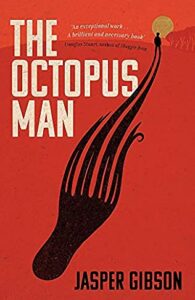
Jasper Gibson, Octopus Man
My friend Jasper’s hilarious and moving book was published this year and I thought it was the best novel I’ve read in years. It’s a timely conversation about mental health, but more than that it is a beautiful, humane and very funny story.
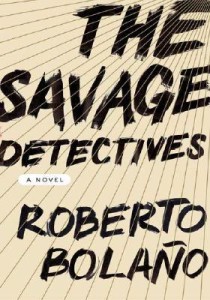
Roberto Bolaño, The Savage Detectives
I took this on a walk on my own through the Asturias into Galicia in Northern Spain along the “Camino Primitivo” or “Original Way” in 2009—the last big jaunt I made before kids and just before recording Been Listening (the cover of that album is from that walk). I needed a book to last me the whole month, and one that I could use as a pillow occasionally as I was traveling light and camping out. Although it’s a searing, vital story about Mexican poets tracing the roots of the artistic soul, there’s a chapter set in a town called Castroverde, which is on the route I took to Santiago. Because of the spell the novel was weaving on me as I walked, that became the real destination of my pilgrimage, and I ended up making most of my album about that place. I reread it recently and it hadn’t lost any of its otherness and power.
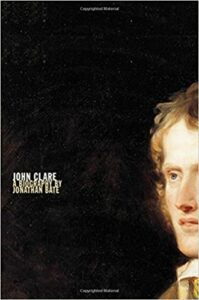
Jonathon Bate, John Clare
A wonderful biography of a beautiful, tortured and poetic soul. John Clare is part of Rob’s universe, and he naturally became part of mine. Rob’s book Landmarks holds space for the memory of Clare’s expression of himself and his deep connection with his landscape through the dialect of his place and time.
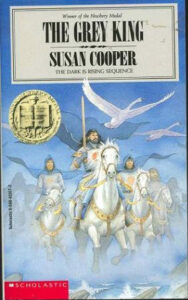
Susan Cooper, The Grey King
The Welsh Cooper! I know the mountains and (bearded) lakes of this fantastic, terrifying story well, and I’ve been as enchanted by her spell-weaving as Rob. I love the multidimensional depth of this one in the series in particular.
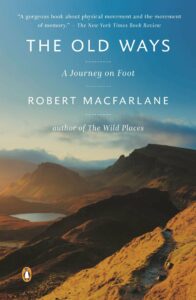
Robert Macfarlane, The Old Ways
It’s hard to choose one book of Rob’s for this list; his writing and thinking has been such a light for me since reading Mountains of The Mind through to Underland and all the books, essays, and conversations in between. The Old Ways is, for me, a centerpiece of his generous thinking—about landscape and our place in it. How we are shaped by the paths we tread, how they shape us, and how the past lives in the way we walk the earth now. These ideas are totally entwined with my own love of folk storytelling and singing and what, I think, drew us to make songs together.
*
Robert Macfarlane’s Five Favorite Books
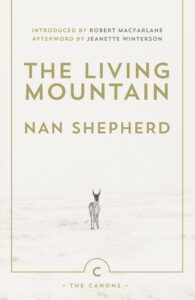
Nan Shepherd, The Living Mountain
A foot-journey into “the nature of being,” set in the Cairngorm Mountains of Northeast Scotland, Shepherd’s slender non-fiction masterpiece re-made mountaineering literature away from the (very male) conquest of the summit, and towards pilgrimage and philosophical reflection.
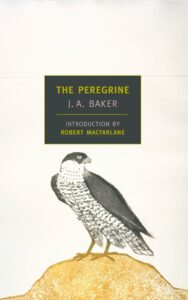
JA Baker, The Peregrine
Baker dreamed of leaving his species behind, slipping his skin and becoming a peregrine, the fastest creature ever to have lived on Earth. His intense meditation on flight and longing seized my imagination and changed my vision when I first read it; Werner Herzog is another of its many fans, and I’m currently working on adapting it into an opera.
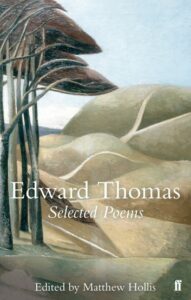
Edward Thomas, The Selected Poems of Edward Thomas
Thomas’s poetry is a shared love and point of reference for both Johnny and me, so really this is a joint choice (but I got there first, mwa ha!). Thomas’s poems map a terrain of chalk paths and forest edges, downlands and deep lanes; he used landscape to imagine his past and future, and used walking as a means of out-pacing his sadness.
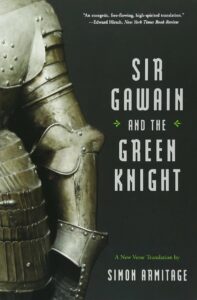
The Gawain Poet (trans. Simon Armitage), Gawain and the Green Knight
I first read this epic medieval poem in Tolkien’s translation while an undergraduate at Cambridge, and its axe-knock alliterations, its tight “bob-and-wheel” form, and of course the mysterious, magnetic presence of the Green Chapel itself, have drawn me back to it as a reader and a writer ever since. The winter scenes, where Gawain travels through the frozen forests of what is now the Wirral, battling monsters and sleeping in his armor by icicle-hung waterfalls, are still some of the coldest sentences I know.
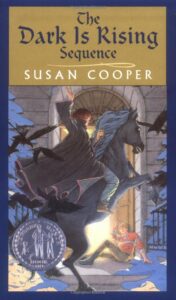
Susan Cooper, The Dark Is Rising
Another book that Johnny and I have in common, and one of the eeriest works I know, from the moment when the rooks take sinister flight as the snowstorm builds above the Thames Valley. Old ways, signs and portents, ancient Manichaean struggles played out across uncanny landscapes—I read this book over and over as a child, and now I read it aloud to my children in turn, and it grips them too.
__________________________________

Excerpted from Grand Journal No. 2 Summer 2021. Reprinted with permission of the publisher.



